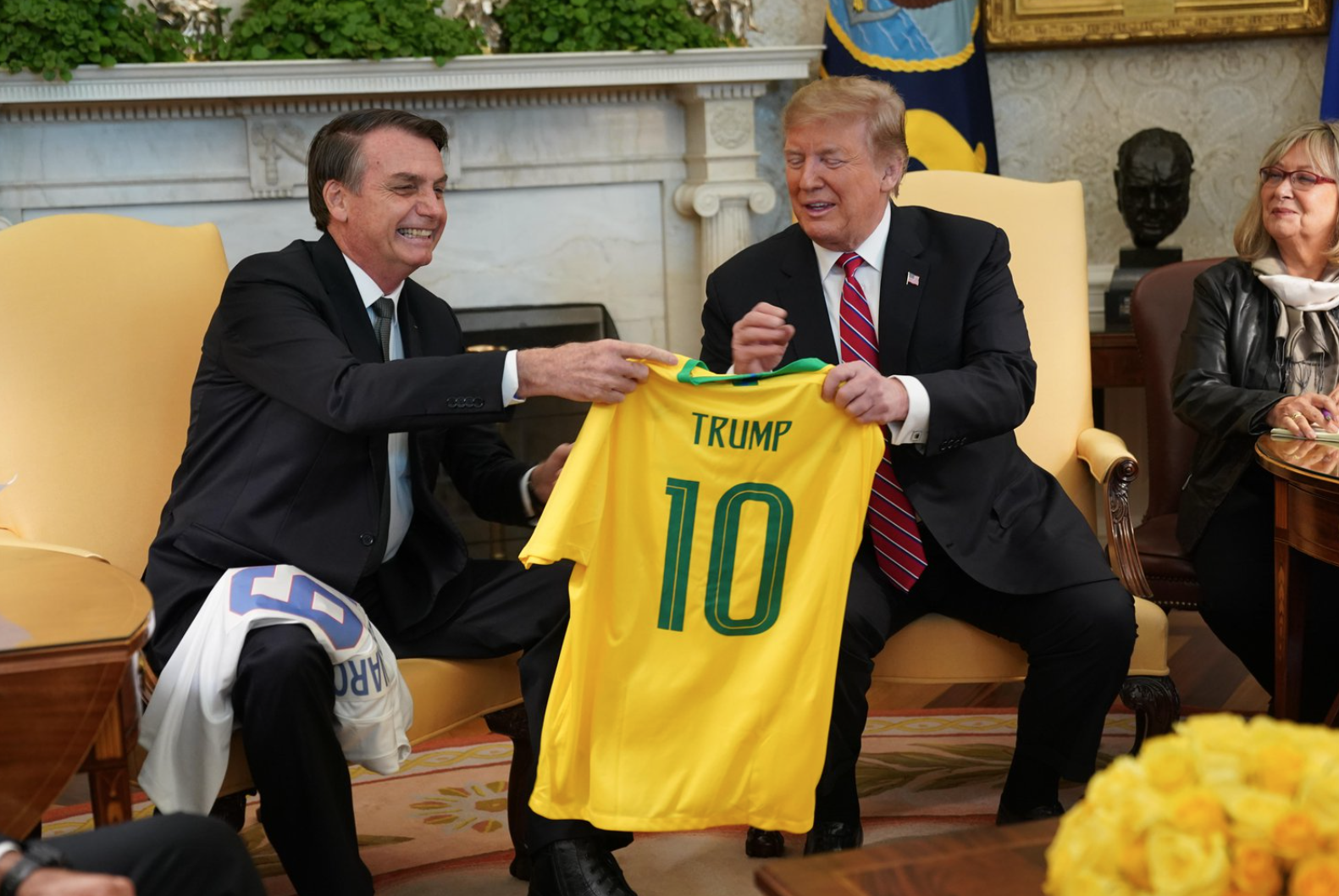Former President Donald Trump officially endorsed Jair Bolsonaro in his re-election bid. In a context of economic crisis and general disgust with the Brazilian president’s extremism, the rival candidate, former president Lula da Silva, leads in all polls by a difference of 15 points with a support of 45%. In this context, to what extent can Trump’s praise serve Bolsonaro?
Trump explained that the “tropical Trump,” as he is affectionately called, has done a great job for the wonderful people of Brazil.” “President Bolsonaro loves Brazil above all else”, Trump wrote. “He is a wonderful man and has my full and complete endorsement!”
On a personal level, love is reciprocal. Bolsonaro went so far as to say he “loves Trump” but it is important to think about the centrality of the cult of the leader and the expectation of total obedience from followers. This type of relationship is not uncommon among fascists and would-be fascists. In 1923, Hitler said, “If a German Mussolini were delivered to Germany, the people would kneel down and worship him more than Mussolini ever did.”
Bolsonaro also agrees in making vulgar and exacerbated machismo a central campaign theme. For example, just as Trump had done in the 2016 campaign, Bolsonaro recently praised his penis and sexual potency to present his suitability as a candidate.
It makes sense that a president under investigation by the judiciary, who failed to deal with the pandemic and who was rejected by a majority of voters and then lied and continues to lie about the outcome of the election, would support a colleague who presents exactly his characteristics.
Worse, Trump then supported the January 6, 2021, takeover of parliament on his behalf on the basis of the big lie that the election had been stolen from him. The purpose of such mobilization was to keep Trump permanently in power regardless of the outcome of the election. It is at this point and in the repeated threats that, if he loses, Bolsonaro will not recognize the election results where a fascist danger for Brazil is possible.
Nowadays, the world is undergoing a profound transformation: an attempted return from populism to fascism. During the last century, fascism has evolved, leaders have reformulated its appearance. Although explicit fascism disappeared from power after World War II, its anti-democratic ideas survived, often intertwined with various currents of populism.
Despite his lack of originality, Bolsonaro stands out among contemporary authoritarian leaders as being, like Donald Trump, closer to fascism than other populists.
There are four elements that differentiate fascism from populism. These are fundamental pillars that fascism has and populism does not. The first is violence and the militarization of politics. This occurred in Spain in the Civil War and also in Fascist Italy and Hitler Germany. All catastrophic examples of political problems being solved through violence.
The second is the lie, the totalitarian, extreme lie, which not only deforms reality and creates alternative realities in people’s minds, but attempts to create that new reality. The third is xenophobia, racism, the total demonization of the imagined external enemy. Any problem that exists (real or invented) is explained and solved through hatred of what is different. And the fourth is dictatorship. There is no fascism without dictatorship, although there can be dictatorship without fascism.
Historically, populists have been elected, for example, Juan Perón, Getulio Vargas, Hugo Chávez, Cristina Kirchner or Silvio Berlusconi. All of them, despite their authoritarianism, recognized the legitimacy of elections even when they did badly in them.
Any observer of Brazilian politics can note that Bolsonaro, a deep admirer of dictatorships and dictators, lacks in practice the fourth element (dictatorship) to become a full-fledged fascist.
In his Independence Day speech, and this is not irrelevant, Bolsonaro classified the other side as ‘evil’. The president’s words were as follows: “The evil that lasted 14 years in our country, that almost broke our homeland and wants to return to the scene of the crime. They will not, the people are on the side of good”. Would this apocalyptic argument allow him to justify in the name of “good” a coup d’état?
Like Donald Trump, Bolsonaro represents a new type of global autocratic ruler who is legally elected, but also adopts elements that populist figures like Perón considered too controversial or even toxic: totalitarian lies, racism and illegal means as coups to destroy democracy from within.
Trump might best be considered a “wannabe fascist.” Trump is a populist who aspires to return to a form of fascism. His administration was not full-blown fascism because it did not descend into dictatorship. But it could have been if his attempts to retain power after the 2020 elections had succeeded.
This is the danger facing Brazilian democracy. Bolsonaro is a sort of mini-Trump. The “tropical Trump” not only shares Trump’s failed fascist desires but also follows the Trumpist model to destroy democracy from within.
Translated from Spanish by Janaína Ruviaro da Silva












